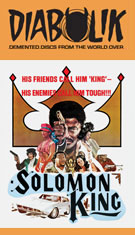
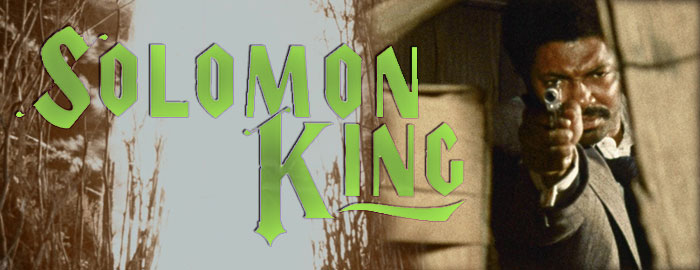
Color, 1974, 87 mins. 18 secs.
Directed by Sal Watts
Starring Sal Watts, “Little” Jamie Watts, Samaki Bennet, Claudia Russo, Felice Kinchelow, Louis Zito, Tito Fuentes, Richard Scarso
Deaf Crocodile (Blu-ray) (US RA HD) / WS (1.85:1) (16:9)
By the time it was 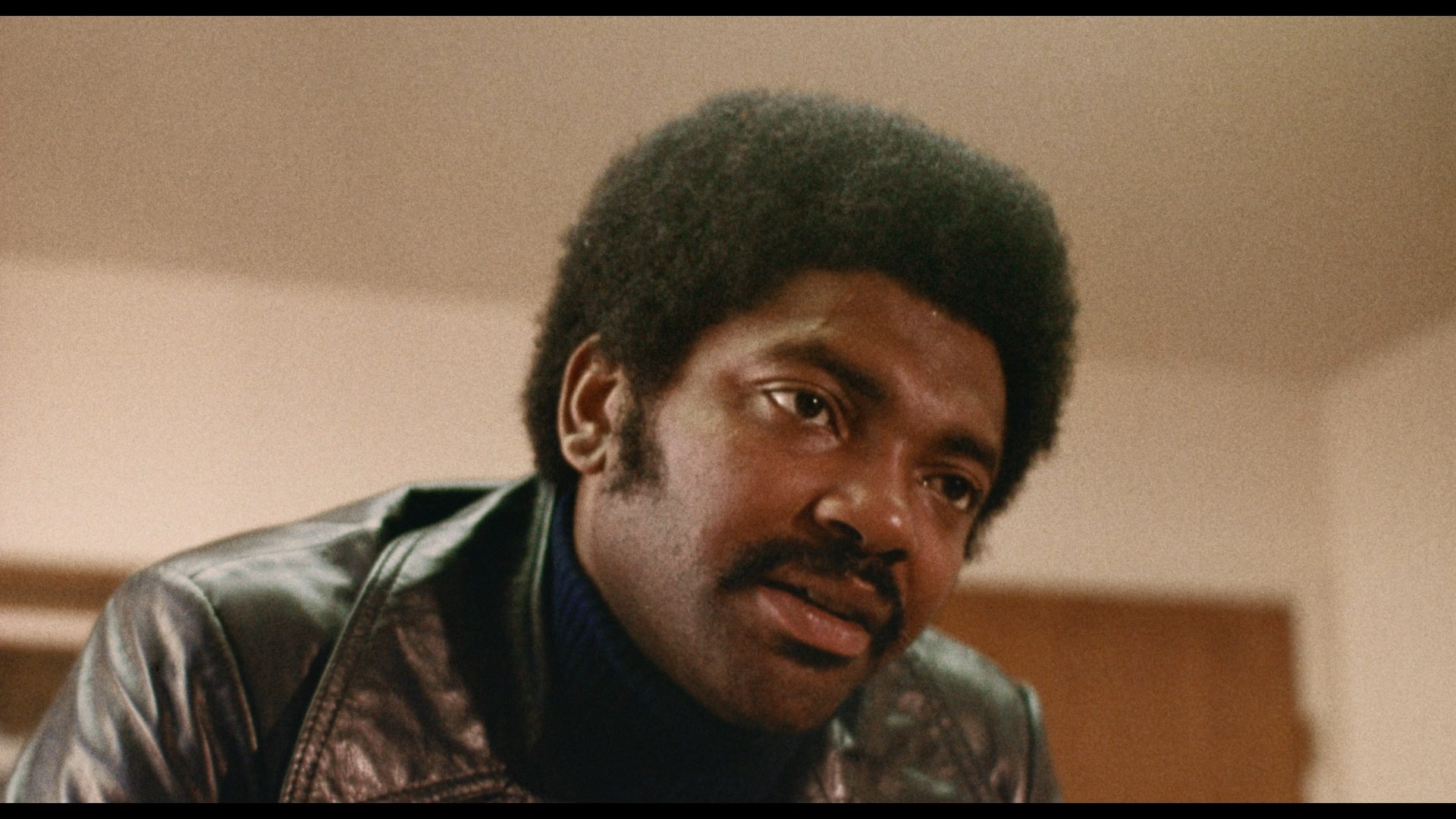 released in the latter half of 1974 shortly after its production in Oakland,
released in the latter half of 1974 shortly after its production in Oakland, 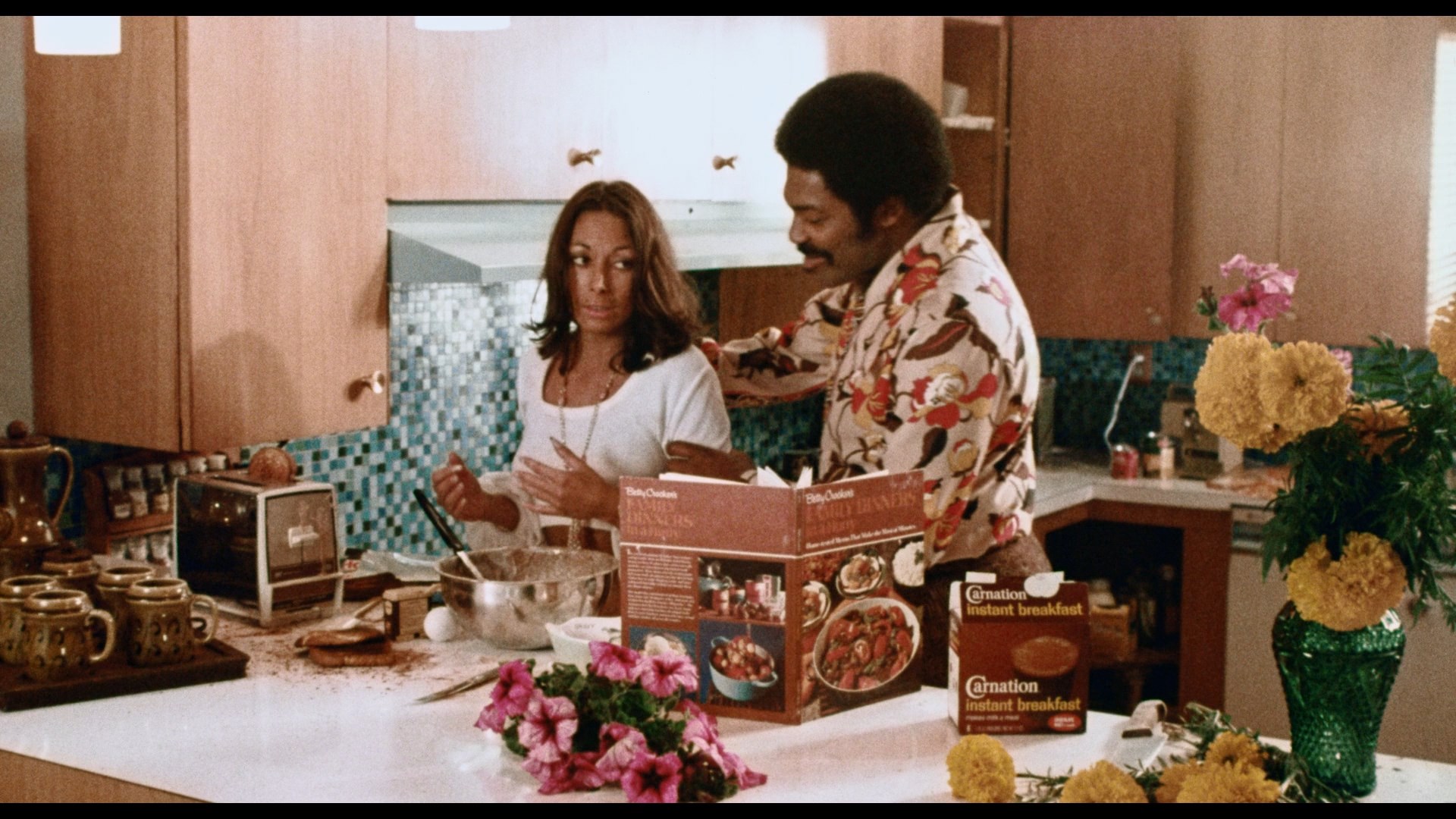 California, this passion project for director, co-writer, and star Sal Watts had little chance to make an impression. The blaxploitation craze that erupted from 1970-71 with films like Cotton Comes to Harlem, Sweet Sweetback's Baadasssss Song, and the crossover breakthrough Shaft had become the domain of major studios and heavy hitter indies like AIP and New World. That meant Solomon King, also briefly retitled Black Agent Lucky King, had to jockey for screen space next to titles like Foxy Brown, Sugar Hill, Black Belt Jones, Willie Dynamite, Abby, Uptown Saturday Night, and Truck Turner. The fact that this film manages to stand apart from the pack is quite an achievement given the competition, packing intriguing political subtext and international intrigue along with a little bit of necessary action thrills involving kicking, gunshots, and explosions.
California, this passion project for director, co-writer, and star Sal Watts had little chance to make an impression. The blaxploitation craze that erupted from 1970-71 with films like Cotton Comes to Harlem, Sweet Sweetback's Baadasssss Song, and the crossover breakthrough Shaft had become the domain of major studios and heavy hitter indies like AIP and New World. That meant Solomon King, also briefly retitled Black Agent Lucky King, had to jockey for screen space next to titles like Foxy Brown, Sugar Hill, Black Belt Jones, Willie Dynamite, Abby, Uptown Saturday Night, and Truck Turner. The fact that this film manages to stand apart from the pack is quite an achievement given the competition, packing intriguing political subtext and international intrigue along with a little bit of necessary action thrills involving kicking, gunshots, and explosions.
Manny King ("Little" Jamie Watts) is out showing an oil field development in Rwanda to royalty including Princess Oneeba (Russo) when they're caught in gunfire unleashed by the suspiciously Causasian-looking, evil Arab Prince Hassan (Scarso). The panicked Manny calls in his brother, Maserati-driving badass Solomon King (Sal Watts), to help him and the Princess when they get back to the U.S. where Solomon, now a nightclub owner, can 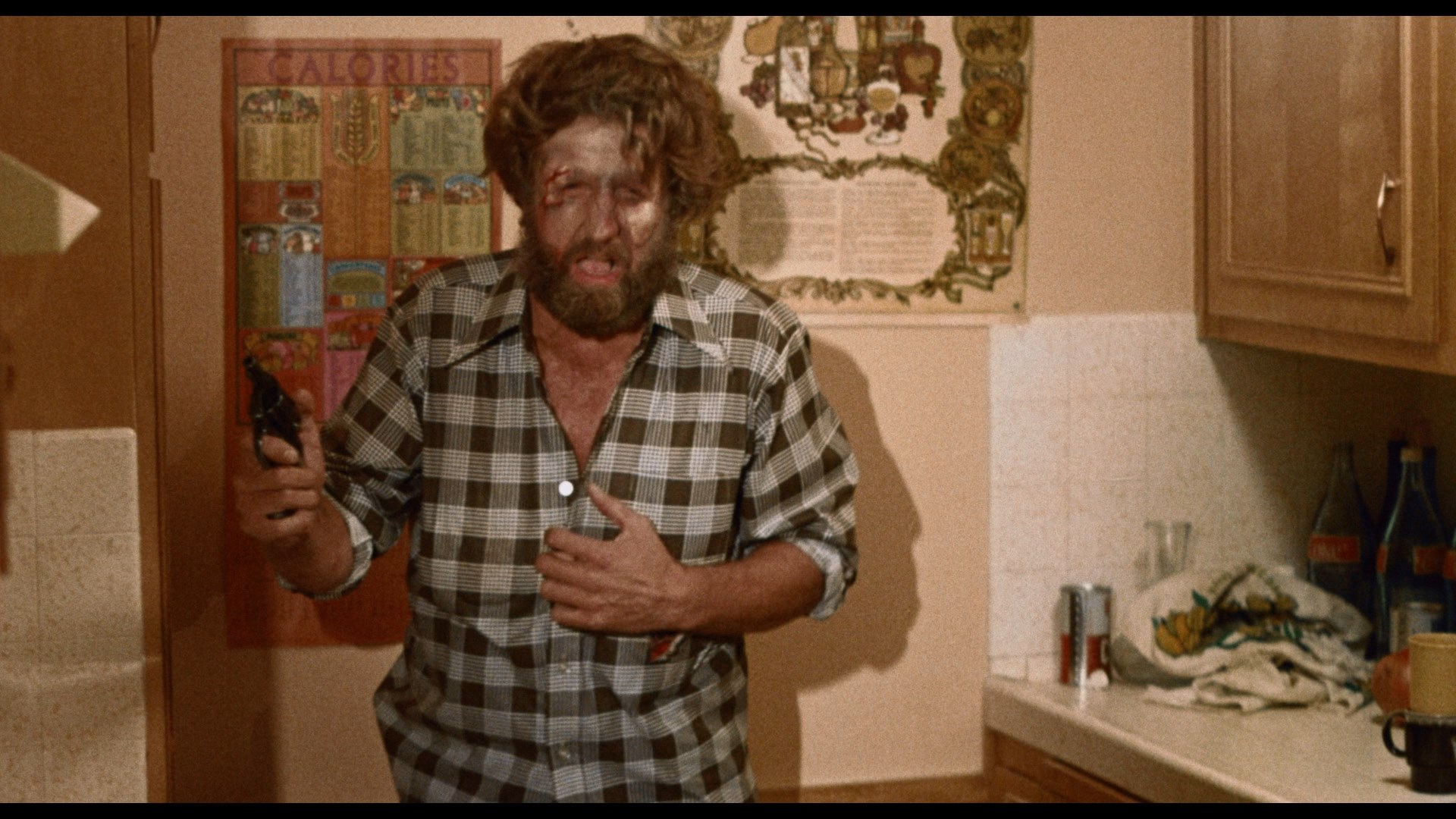 use his Green Beret and former
use his Green Beret and former  CIA assassination and combat skills to good use. Reunited with his casually racist colleagues, King finds his new protection mission far more challenging than expected as it transforms into a relentless quest for vengeance.
CIA assassination and combat skills to good use. Reunited with his casually racist colleagues, King finds his new protection mission far more challenging than expected as it transforms into a relentless quest for vengeance.
From a technical standpoint, Solomon King shows plenty of seams including clunky fight scenes and repeated use of that old standby, cutting to random lengthy shots of cars driving papered with voiceover dialogue to fill in major plot points. Fortunately you can also just kick back and enjoy the fantastic funk soundtrack (guaranteed to lodge in your head for hours) and loads of fantastic local flavor featuring lots of locales you normally never see in front of a camera. Coupled with the cars, the clothes, and lots of wood paneling, it's one of those instant time capsules that probably feels more zesty now than when it was first released.
Released theatrically in the U.S. by Entertainment Pyramid (who also handled Grave of the Vampire and Garden of the Dead) with mostly ineffectual overseas distribution by Manson, Solomon King went out of circulation entirely until the 2023 Blu-ray edition from Deaf Crocodile complete with a Kickstarter campaign. The negative and other printing elements are long gone, but the restoration from a complete 35mm Eastman Kodak print (from the UCLA Film & TV Archive) and the 35mm track negative for the audio from Watts' collection is quite stunning all things considered. Many Blu-rays pulled from prints are visibly constrained but this one looks extremely sharp with a great deal of color restored from the once faded source. The English LPCM 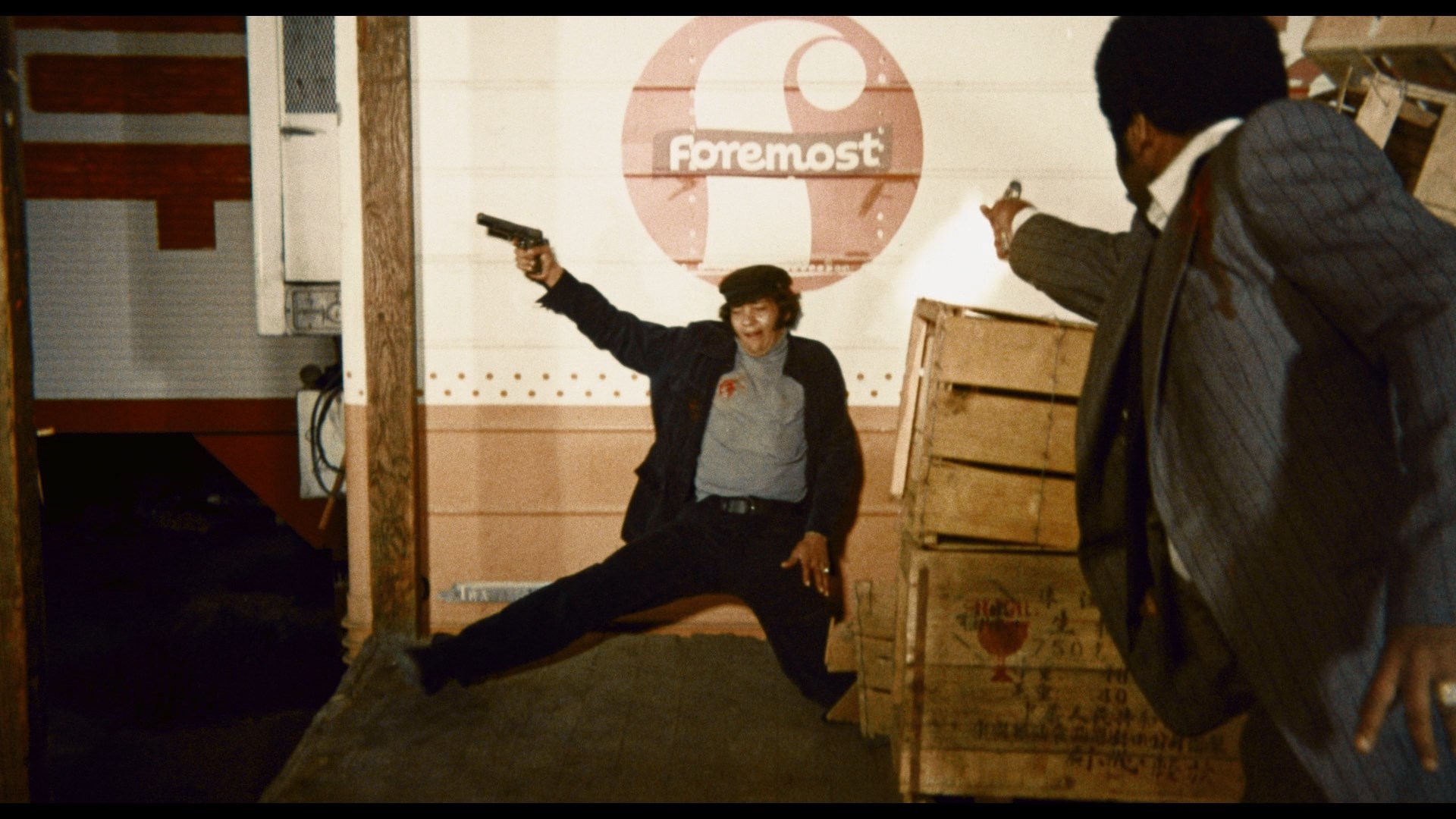 2.0 mono track sounds great throughout, with optional English SDH subtitled provided. Two new audio
2.0 mono track sounds great throughout, with optional English SDH subtitled provided. Two new audio 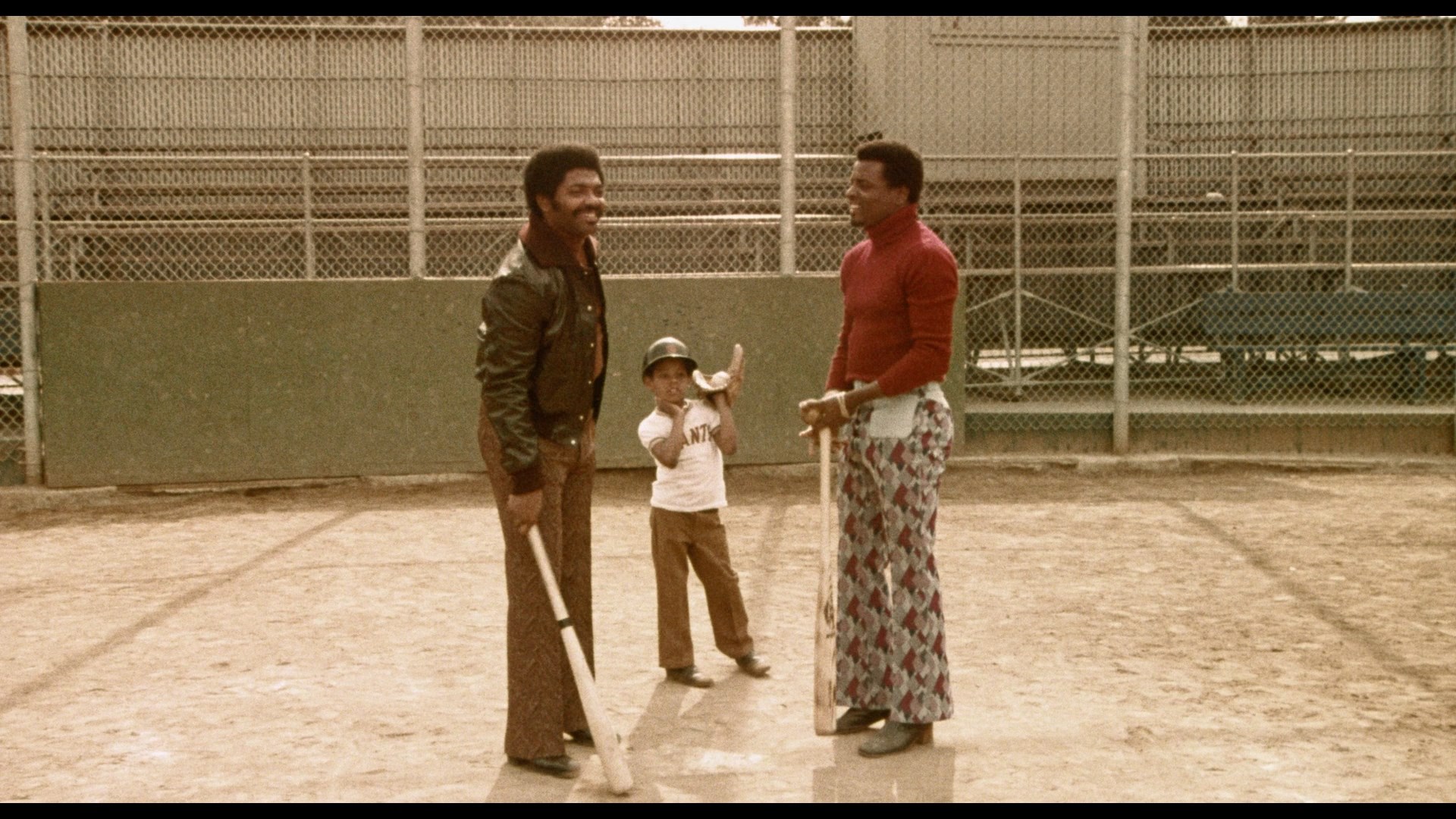 commentaries are provided by Walter Chaw and Steve Ryfle, both of which sketch in some pertinent details about this film's emergence from obscurity while focusing on the broader trajectory of blaxploitation, the common themes of the era including racial politics and socioeconomic undercurrents, concurrent trends like the '70s kung-fu craze, and the DIY elements found here. A fantastic three-part interview with Belinda Burton-Watts, the director-star's widow, is conducted by Jonathan Marlow and focuses on "The Early Years" (32m19s), "Sal Builds an Empire" (27m13s), and "The Later Years" (28m8s), covering not only the making of this film (which tried to distinguish itself from the blaxploitation fold in a few key ways) but some key moments over the years in national history and their lives including a violent altercation that came to impact Sal's life later on. She also goes into the rationale behind the film's title, their thoughts on gender equality, and many aspects of life in Oakland. A 1976 episode of the local Oakland music and dance program The Jay Payton Show executed produced by Watts (51m20s) is a total blast with a host of local acts jamming out on camera with lots of kids dancing their tails off. Also included are a restoration demo (5m58s) showing the extreme lengths needed to bring the film back to life and a a reissue trailer, while the package comes with an insert booklet featuring a new essay by Josiah Howard and a reproduction of the original pressbook.
commentaries are provided by Walter Chaw and Steve Ryfle, both of which sketch in some pertinent details about this film's emergence from obscurity while focusing on the broader trajectory of blaxploitation, the common themes of the era including racial politics and socioeconomic undercurrents, concurrent trends like the '70s kung-fu craze, and the DIY elements found here. A fantastic three-part interview with Belinda Burton-Watts, the director-star's widow, is conducted by Jonathan Marlow and focuses on "The Early Years" (32m19s), "Sal Builds an Empire" (27m13s), and "The Later Years" (28m8s), covering not only the making of this film (which tried to distinguish itself from the blaxploitation fold in a few key ways) but some key moments over the years in national history and their lives including a violent altercation that came to impact Sal's life later on. She also goes into the rationale behind the film's title, their thoughts on gender equality, and many aspects of life in Oakland. A 1976 episode of the local Oakland music and dance program The Jay Payton Show executed produced by Watts (51m20s) is a total blast with a host of local acts jamming out on camera with lots of kids dancing their tails off. Also included are a restoration demo (5m58s) showing the extreme lengths needed to bring the film back to life and a a reissue trailer, while the package comes with an insert booklet featuring a new essay by Josiah Howard and a reproduction of the original pressbook.
Reviewed on January 11, 2023



 released in the latter half of 1974 shortly after its production in Oakland,
released in the latter half of 1974 shortly after its production in Oakland,  California, this passion project for director, co-writer, and star Sal Watts had little chance to make an impression. The blaxploitation craze that erupted from 1970-71 with films like Cotton Comes to Harlem, Sweet Sweetback's Baadasssss Song, and the crossover breakthrough Shaft had become the domain of major studios and heavy hitter indies like AIP and New World. That meant Solomon King, also briefly retitled Black Agent Lucky King, had to jockey for screen space next to titles like Foxy Brown, Sugar Hill, Black Belt Jones, Willie Dynamite, Abby, Uptown Saturday Night, and Truck Turner. The fact that this film manages to stand apart from the pack is quite an achievement given the competition, packing intriguing political subtext and international intrigue along with a little bit of necessary action thrills involving kicking, gunshots, and explosions.
California, this passion project for director, co-writer, and star Sal Watts had little chance to make an impression. The blaxploitation craze that erupted from 1970-71 with films like Cotton Comes to Harlem, Sweet Sweetback's Baadasssss Song, and the crossover breakthrough Shaft had become the domain of major studios and heavy hitter indies like AIP and New World. That meant Solomon King, also briefly retitled Black Agent Lucky King, had to jockey for screen space next to titles like Foxy Brown, Sugar Hill, Black Belt Jones, Willie Dynamite, Abby, Uptown Saturday Night, and Truck Turner. The fact that this film manages to stand apart from the pack is quite an achievement given the competition, packing intriguing political subtext and international intrigue along with a little bit of necessary action thrills involving kicking, gunshots, and explosions.  use his Green Beret and former
use his Green Beret and former  CIA assassination and combat skills to good use. Reunited with his casually racist colleagues, King finds his new protection mission far more challenging than expected as it transforms into a relentless quest for vengeance.
CIA assassination and combat skills to good use. Reunited with his casually racist colleagues, King finds his new protection mission far more challenging than expected as it transforms into a relentless quest for vengeance. 2.0 mono track sounds great throughout, with optional English SDH subtitled provided. Two new audio
2.0 mono track sounds great throughout, with optional English SDH subtitled provided. Two new audio  commentaries are provided by Walter Chaw and Steve Ryfle, both of which sketch in some pertinent details about this film's emergence from obscurity while focusing on the broader trajectory of blaxploitation, the common themes of the era including racial politics and socioeconomic undercurrents, concurrent trends like the '70s kung-fu craze, and the DIY elements found here. A fantastic three-part interview with Belinda Burton-Watts, the director-star's widow, is conducted by Jonathan Marlow and focuses on "The Early Years" (32m19s), "Sal Builds an Empire" (27m13s), and "The Later Years" (28m8s), covering not only the making of this film (which tried to distinguish itself from the blaxploitation fold in a few key ways) but some key moments over the years in national history and their lives including a violent altercation that came to impact Sal's life later on. She also goes into the rationale behind the film's title, their thoughts on gender equality, and many aspects of life in Oakland. A 1976 episode of the local Oakland music and dance program The Jay Payton Show executed produced by Watts (51m20s) is a total blast with a host of local acts jamming out on camera with lots of kids dancing their tails off. Also included are a restoration demo (5m58s) showing the extreme lengths needed to bring the film back to life and a a reissue trailer, while the package comes with an insert booklet featuring a new essay by Josiah Howard and a reproduction of the original pressbook.
commentaries are provided by Walter Chaw and Steve Ryfle, both of which sketch in some pertinent details about this film's emergence from obscurity while focusing on the broader trajectory of blaxploitation, the common themes of the era including racial politics and socioeconomic undercurrents, concurrent trends like the '70s kung-fu craze, and the DIY elements found here. A fantastic three-part interview with Belinda Burton-Watts, the director-star's widow, is conducted by Jonathan Marlow and focuses on "The Early Years" (32m19s), "Sal Builds an Empire" (27m13s), and "The Later Years" (28m8s), covering not only the making of this film (which tried to distinguish itself from the blaxploitation fold in a few key ways) but some key moments over the years in national history and their lives including a violent altercation that came to impact Sal's life later on. She also goes into the rationale behind the film's title, their thoughts on gender equality, and many aspects of life in Oakland. A 1976 episode of the local Oakland music and dance program The Jay Payton Show executed produced by Watts (51m20s) is a total blast with a host of local acts jamming out on camera with lots of kids dancing their tails off. Also included are a restoration demo (5m58s) showing the extreme lengths needed to bring the film back to life and a a reissue trailer, while the package comes with an insert booklet featuring a new essay by Josiah Howard and a reproduction of the original pressbook.